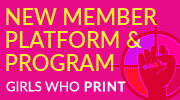Across the years of doing workflow reviews and assessments one question comes up frequently: Where is the next generation of workflow specialist? It’s a good question. It is often followed by: Can I train someone to be my workflow expert?

The answers are related. It is likely that your best candidate for your next generation workflow specialist is already in your shop. And if you spend some time to identify the candidates and ensure that they can apprentice, you could be well on your way to keeping continuity in your workflow.
Let’s start with the basics. Workflow will change over times. Software solutions and processes are directly related to the equipment you have, which is likely to change, and to the types of work you produce, which is also subject to change. So, you are looking for a candidate who embraces change. You want someone who is curious, questioning, and enthusiastic.
Depending on the size of your shop, you might want to designate two or three apprentices so that you have back up as you expand. If they are enthusiastic they can help to teach each other along the way.
Now you need an education plan. Some of your plans will be driven by the type of workflow you run, how automated it is, and how many products your workflow uses. Build a plan that starts at the front of the workflow and walks towards the press. Like this:
1. Job Onboarding: How do jobs come into the shop? Is there a web-to-print front end? Do salespeople bring jobs in? Is there counter service? Have your apprentices experience all the ways work comes in so that they can get a sense of what the Customer Service and Sales team members are working with. If you use estimating programs, show them how they work and how information is loaded and updated so they see the relationship between the consumables and the final pricing.
2. Job Management: How do jobs move to production? How are job tickets created? How are schedules determined? How are work assignments made? If you have a highly automated workflow, take the time to have them trained on the workflow automation tools. For more manual workflows, arrange training on each tool. Today many tools have online, self-service education that can be a fast path to getting to the basics, and then working with the current workflow experts can fill in the gaps.
3. Job Execution: Every shop has a specific way that work is moved into production. Are job tickets updated by hand? Are they scanned? Is there an application they use on their phone? When training up the next generation, do not take anything for granted. Walk them through every step and have them do the steps so that they become muscle memory.
This is the short story, but you get the idea. A path like this might take a year to execute and develop a workflow team that is ready to step in. If you start early and keep your finger on the training pulse, you should be ready for anything!
Don’t forget to check out the other blogs in this series and stop by my Workflow Blog for the step by step guide on how to evaluate the workflow you have!
If you have stories to share, reach out to me! @PatMcGrew on Twitter, on LinkedIn, or [email protected] all reach me.
See more PMC posts on workflow from Pat
 Pat McGrew is the Senior Director and Evangelist for the Production Software and Services team at KeyPoint Intelligence / InfoTrends. As an analyst and industry educator, Pat works with InfoTrends customers and their clients to promote communication effectiveness and best practices. Her experience spans all customer communication channels, plus transaction print, data-driven, and production commercial print using offset, inkjet, and toner. Co-author of 8 industry books, editor of A Guide to the Electronic Document Body of Knowledge, and regular writer in the industry trade press, Pat won the 2014 #GirlsWhoPrint Girlie Award for dedication to education and communication in the industry, and the 2016 Brian Platte Lifetime Achievement Award from Xplor International.
Pat McGrew is the Senior Director and Evangelist for the Production Software and Services team at KeyPoint Intelligence / InfoTrends. As an analyst and industry educator, Pat works with InfoTrends customers and their clients to promote communication effectiveness and best practices. Her experience spans all customer communication channels, plus transaction print, data-driven, and production commercial print using offset, inkjet, and toner. Co-author of 8 industry books, editor of A Guide to the Electronic Document Body of Knowledge, and regular writer in the industry trade press, Pat won the 2014 #GirlsWhoPrint Girlie Award for dedication to education and communication in the industry, and the 2016 Brian Platte Lifetime Achievement Award from Xplor International.











